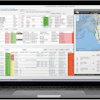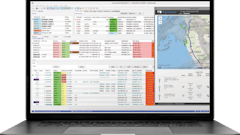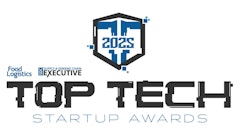Dedham, MA — May 19, 2003 — The transportation management systems (TMS) market is set to almost double over the next five years, but changing customer demands could put in doubt the survival of some solution providers in this space, according to a new report from technology consultancy ARC Advisory Group.
In its latest study "Transportation Management Systems Worldwide Outlook," ARC reported that the TMS market grew by almost 7 percent in 2002, a respectable accomplishment considering the weak economy and reductions in information technology budgets. The consultancy is forecasting a cumulative annual growth rate (CAGR) of 11.6 percent over the next five years, from $860 million in 2002 to nearly $1.5 billion in 2007.
But while the future remains bright for this market overall, the road to success has changed, and many vendors will have a difficult time getting back on track, according to Adrian Gonzalez, director of ARC's Logistics Executive Council and author of the study. "Long-term success will be defined by four factors: scope of solution (expanding beyond basic transportation functionality), net value (realized benefits minus total cost of ownership), financial stability of the solution provider and having a global presence," Gonzalez said.
The consultancy raised the question of whether a standalone TMS vendor can survive in a future world where customers demand holistic solutions that incorporate order management, order fulfillment and performance management capabilities. The future is uncertain for vendors that are unable to meet these expectations, Gonzalez said.
"The competition will intensify as vendors with broader footprints, such as [enterprise resource planning] and [supply chain management] vendors, as well as third-party logistics providers (3PLs), place a stronger emphasis on this market," added Gonzalez. "For example, a vendor like Microsoft, with no TMS capability today but making inroads with its other enterprise offerings, can conceivably become a dominant player in the future if it becomes interested and develops a smart strategy."
Elsewhere in the report, Gonzalez noted that while most companies are utilizing TMS to manage their outbound operations, a growing number are beginning to shift their focus to inbound. "The economic environment and competitive landscape are forcing companies to find new ways to reduce costs and improve productivity," the analyst explained. "And taking greater control of your inbound processes is the low hanging fruit, especially for retailers that are trying to keep pace with Wal-Mart."
About 20 percent of the TMS revenues generated in 2002 were for implementations that focused on inbound operations, ARC reported.
In addition, Gonzalez reported that hosted solutions and recurring-revenue pricing models such as subscription fees continue to be viable in the TMS space. A few years ago TMS vendors were among the first to offer such options, and while this strategy has failed in other markets, it continues to succeed in the TMS arena. "Recurring revenues accounted for about 20 percent of the market in 2001, but in 2002, the percentage increased to over 22 percent," the analyst said.
The ARC study also revealed that externally hosted solutions accounted for close to 30 percent of TMS revenues last year. "Companies are taking a net value perspective when considering IT investments, and in many cases a hosted solution coupled with a recurring pricing model is the best option," Gonzalez concluded.
The study addresses these topics in greater detail and includes market shares by solution type, geographic region, customer tier and vertical industry, plus forecasts and supplier profiles.
For more information on transportation management systems, see the Global Enabled Supply and Demand Chain Series article on Fulfillment and Logistics in the upcoming June/July 2003 issue of iSource Business.

![Pros To Know 2026 [color]](https://img.sdcexec.com/mindful/acbm/workspaces/default/uploads/2025/08/prostoknow-2026-color.mduFvhpgMk.png?auto=format%2Ccompress&bg=fff&fill-color=fff&fit=fill&h=100&q=70&w=100)



![Pros To Know 2026 [color]](https://img.sdcexec.com/mindful/acbm/workspaces/default/uploads/2025/08/prostoknow-2026-color.mduFvhpgMk.png?ar=16%3A9&auto=format%2Ccompress&bg=fff&fill-color=fff&fit=fill&h=135&q=70&w=240)








